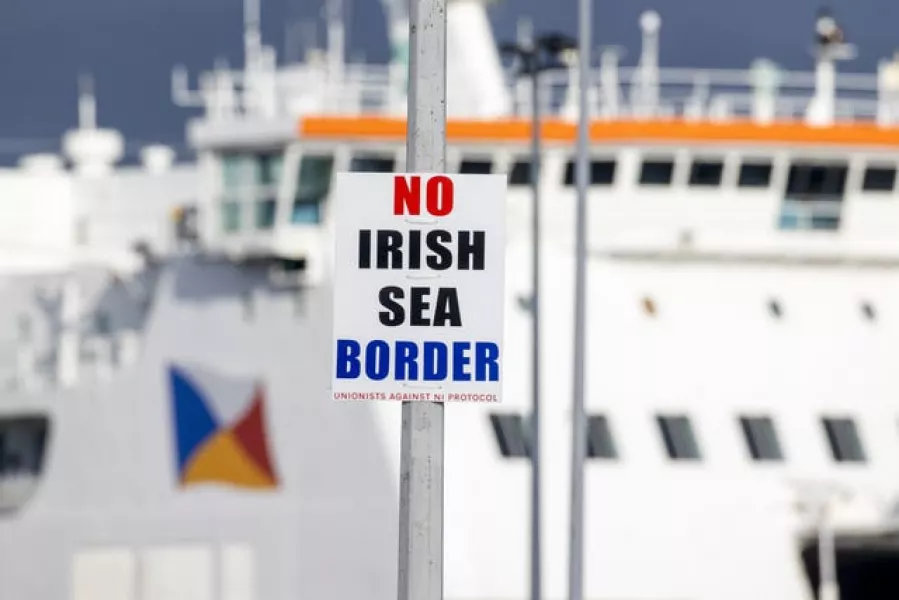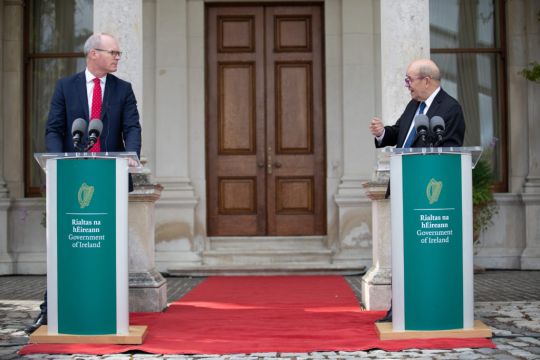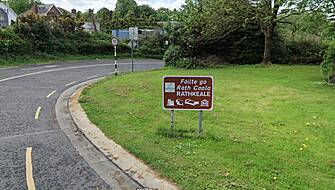The number of checks on goods arriving into Northern Ireland from Britain could be reduced by 80 per cent, the Foreign Affairs minister has said.
Simon Coveney said the option exists within the Northern Ireland Protocol if the UK was willing to agree a common approach to standards in relation to veterinary practices, and sanitary and phytosanitary standards on food.
A new raft of checks on goods at the ports of Belfast and Larne under the terms of the protocol have sparked anger among unionists and loyalists who feel Northern Ireland is being separated from the rest of the UK.

Both outgoing DUP leader Arlene Foster and her incoming successor Edwin Poots have insisted the protocol must be scrapped.
The UK and the EU remain in talks.
Speaking in Dublin as he welcomed his French counterpart Jean-Yves Le Drian and the French minister for European affairs Clement Beaune to Farmleigh Estate for talks, Mr Coveney urged progress.
He emphasised the Northern Ireland Protocol was “negotiated, designed, agreed, voted on and ratified as part of the Withdrawal Agreement by both the UK and the EU”.
He also insisted that the disruption has been caused by the “type of Brexit that was chosen by the British Government”, not the protocol.
The politics around the protocol in Northern Ireland are dangerous, divisive and very polarising
“The United Kingdom is of course raising questions around the implementation of the agreement now which is problematic and I think it is important to say that the politics around the protocol in Northern Ireland are dangerous, divisive and very polarising,” he said.
“So we do need to work together to find a way of implementing the protocol in a way that is consistent with the commitments in that protocol but in a way that limits the disruption for people who have genuine concerns in Northern Ireland.
“But I believe we can do that within the confines of the protocol itself, in terms of flexibility and pragmatism and I think that Vice President Sefcovic working with [David] Frost need to find a way of doing that, and I believe on the EU side, certainly they can.”
Reduce
Mr Coveney said: “For example, we could reduce the number of checks in ports in Belfast and in Larne by 80 per cent if the British Government decided they were willing to agree with the EU a common approach to standards in relation to veterinary practices, and sanitary and phytosanitary standards on food.
“That option is there within the confines of the protocol and it could dramatically reduce the number of checks linked to the protocol that many people are upset about.
“There is a way forward here but it has to be on the basis of partnership, not a British Government trying to outmanoeuvre the EU politically in the context of articles in the Financial Times or the Spectator or in other newspapers.”
Mr Coveney said unilateral action by the British Government would be “a disaster for relationships, for trust and for politics”.
Jean-Yves Le Drian said the protocol was agreed by the UK and it is binding.
Mr Beaune was critical of the UK over fishing.
He said he expected “full and speedy compliance with the commitment made”.
“We negotiated side by side with Ireland and all of our European partners a deal that is binding, binding on the European Union and the United Kingdom,” he said.
Speaking ahead of the meeting Mr Coveney thanked France for its “unwavering support” to Ireland throughout the Brexit process and its “dedication to the peace process and relationships on this island”.
Heureux d’être de retour à Dublin aujourd’hui avec @CBeaune pour marquer la forte relation qui lie la France et Irlande.
Avec nos interlocuteurs nous évoquerons les conséquences du Brexit, l’agenda européen, les dossiers économiques et internationaux.
🇫🇷-🇮🇪#Eireann https://t.co/7I5UNKH0U5— Jean-Yves Le Drian (@JY_LeDrian) May 20, 2021
Mr Le Drian responded saying the Northern Ireland Protocol is “not just about complying with commitments made, but also about peace”.
“The United Kingdom remain a key partner for us and there are many things we have to do in our common interests, but now it is for the United Kingdom to tell us what they are ready for. We stand ready to work together like I told Dominic Raab a week ago,” he said.
He described an earlier visit to Dublin Port, where he saw the implementation of customs and health controls on goods arriving from Britain, as “very interesting”.
It was indicated that French president Emmanuel Macron would visit Ireland before the end of 2021.







